Black History Month 2012: Highlighting the Contributions of African Americans in Emergency Management
In honor of Black History Month, the Federal Emergency Management Agency’s Individual and Community Preparedness Division would like to recognize Africans Americans for their significant contributions to the field of emergency management. We were fortunate to have the opportunity to speak to a few individuals and to ask them questions pertaining to their experiences in emergency management.
Pauline Campbell
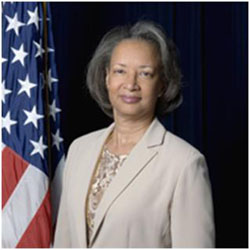
Pauline C. Campbell was appointed Director of the Office of Equal Rights in November 1996 after holding positions of increasing responsibility in the agency since 1989. In her current role, Ms. Campbell manages a comprehensive program of civil rights compliance, equal employment opportunity processing, affirmative action initiatives and disability access policy. Her program covers both agency employees and disaster applicants.
Q: How did you become involved in emergency management?
It was purely by chance. Back in the late 1980s, my husband was transferred to Andrews Air Force Base, and I was looking for work in the DC area. I had previously been working for an insurance company. Before I left the insurance company, I came across an advertisement in the DC area for an information technology position, and I applied. I would be working for an IT team that supported the Disaster Assistance Department within FEMA. Within a week of starting my employment with the agency, I headed to the Virgin Islands and experienced my first hurricane, and I was in shock. When I worked with the insurance company, I dealt indirectly with people who needed disaster assistance with their finances. However, Hurricane Hugo was my first up close and personal experience with a disaster. I stayed in the Virgin Islands for a few weeks and then another storm hit. My exposure to disasters came from my IT position. We were responsible for setting up networks, getting computers set up, troubleshooting, etc. Even though I fell into this career path, I feel very lucky that I wound up where I am now.
Q: Why do you feel it is important for African Americans to have an increasingly active role in emergency management?
I believe it is important for each of us to embrace and acknowledge our world is changing. We cannot strengthen our ability to respond to and recover from disasters if each of us don’t help one another. I am not saying everyone needs to volunteer or have a job in emergency management, but knowing what to do in the event of a disaster or having an emergency plan in place has a greater impact on our ability to deal with and recover from the event than if those things were not in place. We have built a lot of homes and infrastructure in high risk areas, and disasters are going to happen. If you don’t know what the risk is in your area and if you don’t pay attention to the potential, then the impact for you is much higher than for those who are aware and more prepared. I encourage all of us to help one another within each of our communities.
Sherry Capers
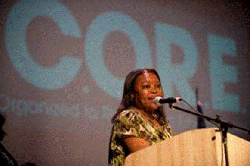
Sherry Capers began her formal career in emergency management in 1999 in Greater New York. She held the position of Assistant Director of Client Services for the American Red Cross in its emergency services department. She was involved in many local and national disaster responses, most notably the 2001 World Trade Center attack. She moved to Miami, Florida in 2004 after she earned a position at the Miami-Dade Office of Emergency Management (MDEM).
Q: Who would you consider to be an inspiring figure in the field of emergency management? How have they affected the way you manage your work?
I have great deal of respect for Administrator Fugate as well as Dr. Jannah Scott, the Deputy Director of the Center for Faith-Based and Neighborhood Partnerships at the United States Department of Homeland Security. They both show dedication to the field and mission of emergency management. I think since 9/11, we as a nation, have been striving to make this country more resilient to disasters, whether they are natural or man-made. Through their work, they have been able to get this charge back down to the local level, where it matters most. They have been able to get more community leaders, faith-based organizations, schools, and individuals to see this effort happen because they make it happen. It doesn’t just happen on it’s own. They also then follow through with not only why it is important to work together, but offers them access the resources to make it happen.
Q: How did you become involved in emergency management?
I began my career in the field of social work and then received my Masters from Fordham University in New York. After receiving my Masters, I worked 14 years with the American Red Cross. In 1999, I received a promotion to manage disaster client social services. It was truly a rewarding experience. I was able to look at the situations other families were in, and it made me realize the impact preparedness education and efforts make on individuals and communities in the aftermath of a disaster.
I will also never forget working with the American Red Cross on September 11, 2001. I was the Family Services Officer and responsible for so many lives that day and in the days following. That was the day the entire nation stood up and came together as one and it is that type of effort each of us can make happen in our own communities. That memory will always stay close to my heart and is why I have become so involved in emergency management and being a member on national board committees to help shape long-term disaster recovery efforts.
Chief Rosemary Cloud
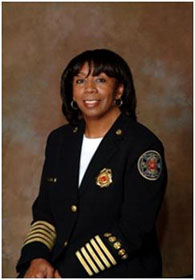
Rosemary Roberts Cloud is the Fire Chief for the City of East Point, Georgia, and is our nation’s first African American female fire chief. Chief Cloud has a Masters Degree in Homeland Security from the Naval Postgraduate School; a BS Degree in Applied Behavioral Science from National-Louis University and is a graduate of the Senior Executives in State and Local Government program at the Kennedy School of Government, Harvard University.
Q: How did you become involved in emergency management?
I began my career as a paralegal. Nobody in my family had been a firefighter in the past, and my family wanted me to go to law school. As a result, I really did not have a connection to being a firefighter. I felt that connection when I watched a fire take place at the Loews Grand Theater in downtown Atlanta. During this time, many fire departments were open to recruiting women and minorities. I believe a divine power led me to emergency management, and I could not be more blessed in the work I do.
Q: You have had a great deal of success in your role as a firefighter and a leader within the emergency management community, how do you encourage Whole Community in your area?
Since 9/11, I have supported a mission that fire departments have a role beyond just fighting fires and should strongly embrace emergency management. Whole Community is not new to us here in Georgia. I have been working with members of the community including the mayor, community leaders, and church officials for 30 years. When Administrative Fugate talks about Whole Community, I get what he is saying; we do it every day here in my community. We strive to help individuals and communities understand they all play a part in making our neighborhoods stronger and more resilient to disasters. Disasters don’t include just fires; they come in all forms such as hurricanes, tornadoes, and flooding events. Communication and education is key. I have had great success working with these people every day, and I strongly encourage each of you to do the same in your respective communities.
For more information about Chief Cloud and her work, please visit:
- News: Fire Chief Rosemary Cloud to be Inducted into Hall of Fame (10/1/11)
- News: Fire Chief Creates Path for Others to Follow (9/7/08)
W. Derrick Lea
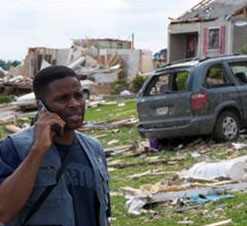
W. Derrick Lea is presently the Disaster Assistance Response Team Director for Islamic Relief USA. He is responsible for creating a citizen training program that develops a well-rounded set of individual skills in sheltering, first aid, food supply, and emotional care for disaster survivors. He completed twenty years of service in public safety before retiring in Prince Georges County, Maryland as Deputy Director of Operations.
Q: Who would you consider to be an inspiring figure in the field of emergency management? How have they affected the way you manage your work?
I have to say the respect I have for the fire department where I worked for 20 years and the individuals within that line of work continues to amaze me and impact me on a daily basis. The dedication required to perform a job like that on a daily basis is something I know has prepared and fortified me to do the work I am doing today in disaster relief. The dedication firefighters and emergency responders have in looking after our communities and keeping them safe is where I find the persistence and dedication to perform my job on a daily basis.
Q: How did you become involved with emergency management?
After I left public safety, I was working with a few nonprofits when Islamic Relief reached out to me and asked if I could create a disaster assistance plan for them. After I presented a plan to them, they asked if I would be willing to implement the plan as the team lead. I have been working as the Disaster Assistance Response Team Director for Islamic Relief ever since.
Q: You have done a lot to support the Whole Community approach to disaster preparedness and response, how have you worked with faith based organizations to organize and prepare them for disaster response?
The reality is faith-based organizations contribute to our society because they care about the communities that surround them so when we are faced with a disaster relief problem and you present the issue at hand to them, they don’t hesitate to get involved. For example, when Islamic Relief went to the Southern California area, we talked to various Islamic religious leaders in local mosques and brought the idea to their attention for them to use their facilities as shelters during disasters. Next, we set up an assessment process for them to better evaluate those facilities. When we presented our findings to the leaders, they were so responsive we knew it could only benefit the communities they serve. Faith-based organizations understand everyone has a role in building resilient communities, and they are always there to help any individual and/or community in a time of need.
For more information about W. Derrick Lea and Islamic Relief, please visit:
Islamic Relief USA: Disaster Assistance Response Team
Dr. Jannah Scott
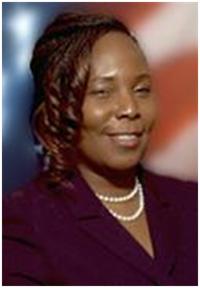
Dr. Jannah Scott was appointed by President Obama in March 2009 and currently serves as the Deputy Director of the Center for Faith-Based and Neighborhood Partnerships at the United States Department of Homeland Security. Prior to her presidential appointment, Jannah served as the Policy Adviser for Faith and Community Initiatives for former Arizona Governor—and now Homeland Security Secretary—Janet Napolitano.
Q: Who would you consider to be an inspiring figure in the field of emergency management? How have they affected the way you manage your work?
When I think about somebody in the field of emergency management who has a strong grasp on issues, a commitment to excellence and the concerns of the people, I look up to Secretary Janet Napolitano. Before being appointed by President Obama in 2009 as the Deputy Director of the Center for Faith-Based and Neighborhood Partnerships, I was the Policy Adviser for Faith and Community Initiatives under the former Governor Napolitano in Arizona. At the time, I had very little experience in emergency management, but Ms. Napolitano trusted me to do the job, and her advice and guidance during Hurricane Katrina helped me succeed as Policy Adviser.
Q: You have done a lot to support the Whole Community approach to disaster preparedness and response, how have you worked with faith based organizations to organize and prepare them for disaster response?
After Hurricane Katrina hit in 2005, Arizona received a lot evacuees that had been flown over from Louisiana. It was our responsibility to shelter and stabilize them. We received a lot of people from New Orleans who had been stranded on their rooftops for five days. When the survivors arrived in Phoenix, we sent employees to greet and comfort them. I remember one woman asked when she arrived, “Where am I?” These people had been under so much stress and many of the elderly had not been taking their medications for nearly a week.
In order to take advantage of our resources, I reached out to religious groups in the Mormon community. They graciously donated 60,000 bottles of water for the survivors. In Phoenix, we created a disaster assistance center that included shelter, a daycare, and medical assistance. I reached out to the African American Episcopal Church, and twelve volunteer physicians were able to assist the survivors’ medical needs. By contacting these faith-based organizations, we were able to receive a lot of aid for the disaster survivors.
The more we can institutionalize the lessons of the Whole Community model, the more we will be in business.
Eric Smith
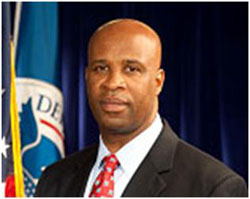
Eric Smith joined FEMA in April 2007, as the Assistant Administrator for the newly created Logistics Management Directorate (LMD). Mr. Smith came to FEMA from his last military active duty assignment as the senior executive assistant to the Director, Defense Logistics Agency (DLA) where he was responsible for all facets of executive level support and tasks for the nation's largest combat support agency. Mr. Smith's military awards and decorations include the Defense Meritorious Service Medal; Meritorious Service Medal; Joint Service Commendation Medal; Army Commendation Medal; Joint Service Achievement Medal; National Defense Service Medal; Global War on Terrorism Expeditionary Medal; Global War on Terrorism Service Medal; Multinational Forces and Observers Medal; Parachutist Badge; and Army Staff Badge.
Q: How did you get started in emergency management?
When Hurricane Rita and Katrina hit the United States in 2005, there came a point when the federal government requested assistance from the Department of Defense. At the time, I was the Director of the Defense Logistics Agency Joint Logistics Operations Center, which was responsible for providing supplies and services to the Department of Defense. As the Director, it was my job to plan and execute logistics support plans to assist FEMA with their disaster response efforts. After Rita and Katrina, Defense Logistics Agency continued to share a working relationship with FEMA.
Q: What is your greatest challenge at working to continue the whole community model?
The whole community concept has been an evolution of FEMA’s mission, and for the past few years we have developed a logistics concept to support this approach. When I arrived in FEMA in 2007 our approach was to give states whatever they desired in preparation for disaster response. Throughout the years, FEMA has transitioned from giving states lots of resource support without the benefit of planning to assist them in self-assessing then developing training and exercise plans to receive and distribute resources in response to disasters. We have gone from being givers to instructors to facilitators. Since 2009, our primary focus has been facilitating logistics support rather than responding to unplanned requirements. We learned early on that FEMA cannot do everything by itself. Part of my responsibilities as being the National Logistics Coordinator is to integrate the robust capability of our whole community partners.
Q: Who do you look up to in your field? How have they affected the way you manage your work?
When I served in the army, two general officers had a profound impact on my career. General James W. Monroe was the highest ranking African American officer I served under early in my career. He was a great role model for me and provided a very positive image of military bearing and how young officers should carry themselves. General Robert T. Dail, who was the Director of the Defense Logistics Agency during my last career assignment, was also an inspiration for me because when I was a mid-career officer he taught me how to plan complex logistics operations which ultimately prepared me for the logistics position at FEMA. However, my wife is my biggest fan, and my greatest inspiration in life.
Reverend Randy G. Vaughn
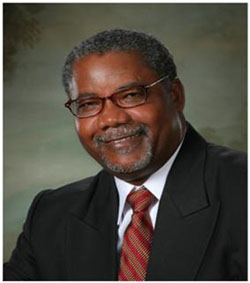
Reverend Randy G. Vaughn has been a pastor at Mount Sinai Missionary Baptist Church in Port Arthur, Texas for the past 27 years. He currently serves as the Director of the Office of Disaster Management for the National Baptist Convention. He is the founder and president of the Succour Foundation, an organization that renders spiritual and humanitarian aid to the people of Haiti. He is also the founder and president of “Help, I’m Hurting,” a community service organization that provides counseling and services to individuals and families in the community.
Q: How did you, as a pastor of a church, become involved in emergency management?
After witnessing Hurricane Rita storm through my community, I was motivated to be of assistance to the families who called upon me for help. I am originally from Port Arthur, Texas and still live in this great State. When Hurricane Katrina hit, my town was one of the first towns where people stopped to seek shelter and refuge. Hurricane Rita hit my community shortly after Katrina. It was then I realized, from a national perspective, we did not have an organized response to disasters. In the past, our churches helped respond to disasters, but there was little organization for how we collectively formed our responses and actions. After Hurricane Rita, I realized we needed a collective national body that spoke on the behalf of denominations during a disaster crisis. As a result, I designed the disaster management plan for the National Baptist Convention.
Q: What advice do you have for faith-based organizations to become an active part of any emergency or disaster response?
The answer rests with education. People need to be educated in their local communities and understand what emergency management is all about. It is important community members and emergency managers get connected in that network. There needs to be a bridge connecting the assets of faith-based organizations with those of emergency managers so they can build and learn from one another. I strongly encourage each faith-based organization to reach out to its local community leader and emergency manager, become a part of the Whole Community effort to building stronger, more resilient communities….all it takes is for someone to take that first step, the rest will fall into place.
For more information about Dr. Vaughn and the National Baptist Convention, please visit:
Medical Mission to Haiti January 30-February 3, 2012: Report and Daily Journal
Russell Washington
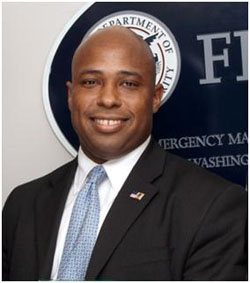
Russell Washington currently serves as the Director of FEMA’s National Watch Center. Since joining FEMA in 2007, Russell has served in numerous leadership positions in the National Response Coordination Center and the National Watch Center. In 2008, he was selected by the FEMA Administrator to coordinate air operations in New Orleans, Los Angeles, and Austin during Hurricanes Gustav and Ike.
Q: Why do you feel it is important for African Americans to have an increasingly active role in emergency management?
We as African Americans need to be aware we are an integral part of the emergency management community’s ‘Whole Community’ approach to disaster preparedness, response, and recovery. One of the key principles of Whole Community is engaging and empowering all parts of the community (public, private, and civic) in defining individual and community needs and providing ways to meet and strengthen them on a daily basis to improve resilience and emergency management outcomes.
It is important, we as African Americans embrace this Whole Community approach and help the communities in which we live in to become more resilient to any disaster or emergency event. It is also important to understand resilience includes more than just infrastructure. It includes resilience within a community’s economy, and even their social capital. Resiliency begins with prepared individuals and strengthens based on the engagement and leadership of local government and community leaders. Individuals and families must also enhance their awareness of risk and threats and develop household emergency plans that include care for those with functional needs.
Q: Who would you consider to be an inspiring figure in the field of emergency management? How have they affected the way you manage your work?
I admire Administrator Craig Fugate, and his dedication to working with first responders and community workers. I think it is great he came here to FEMA headquarters from Florida and has been able to apply his field-level experience to helping first responders and community workers become better prepared to assist individuals and communities responding to and recovering from any disaster event. He also understands that to build a stronger, more resilient nation, it is not just the responsibility of one or even two individuals or organizations; it is a shared responsibility within communities, government agencies, volunteer organizations, emergency responders and so many more. Everyone has a role in this charge.
Jason Yancey
Jason Yancey serves as Director for HOPE Coalition America (HCA), the emergency preparedness and response division of Operation HOPE, Inc. and Director of Consumer Financial Protection. Jason has completed NeighborWorks’ nationally-recognized Foreclosure Intervention and Default Counseling certification, and is a fully certified Foreclosure Prevention Counselor and Credit Counselor. His work supporting the Mortgage HOPE Crisis Hotline (MHCH) has assisted thousands of clients in delaying and preventing foreclosure. He provides financial literacy information which ensures that clients finish the program with a clear plan of action for their homes, budgets and financial futures.
Q: How did you get involved in emergency management?
Within Operation HOPE, we have a division that focuses on emergency preparedness and recovery from disasters. Once I started working in that division, I wanted to learn more about emergency preparedness. As a mission of mine, I wanted to get the information about preparedness out to the public.
Q: Who would you consider to be an inspiring figure in the field of emergency management? How have they affected the way you manage your work?
I’ve always looked up to John Bryant, the CEO of Operation HOPE. It has always been his mission to help people in their communities.
Q: Why do you feel it is important for African Americans to have an increasingly active role in emergency management?
I think it makes a huge difference African Americans to take care of our own communities. We need to have support and need to plan ahead before a disaster occurs. For example, Operation HOPE created a preparedness plan within our organization. Our organization is located on the 30th floor in downtown Los Angeles, and it lies directly on a fault. We worked with emergency managers to create an evacuation procedure for people who would need to evacuate from the 30th floor in case of an emergency.
Q: What is your greatest challenge at working to continue the whole community model?
Our greatest challenge is making sure that we are getting our information out to the public. For example, we need to work on getting the financial resources and human capital needed to spread our message to the public.
For more information about Jason Yancey and his work with Operation HOPE, please visit:

